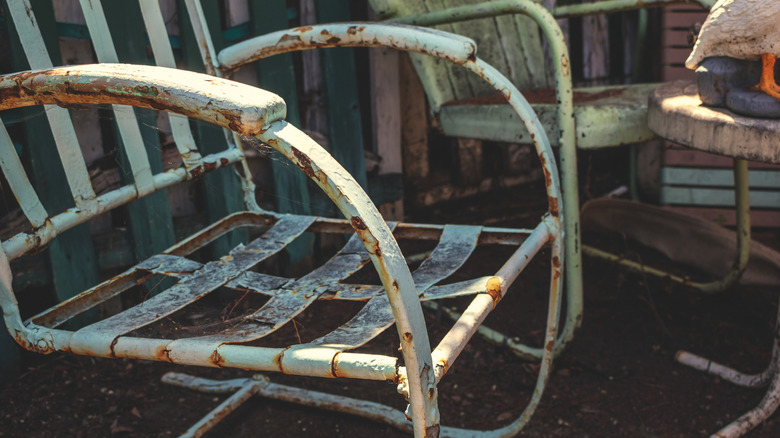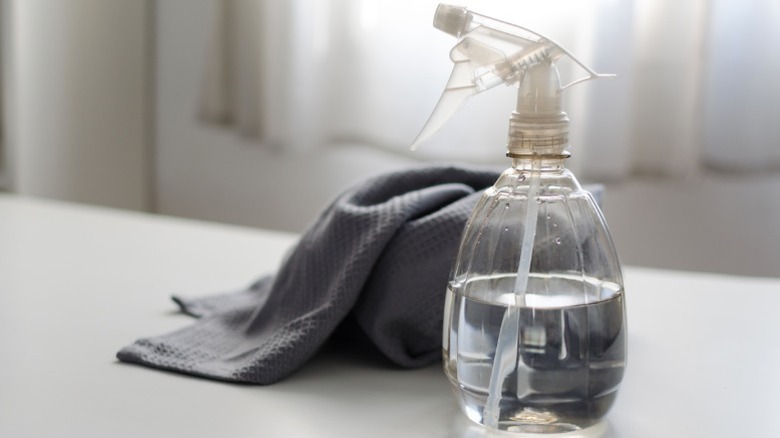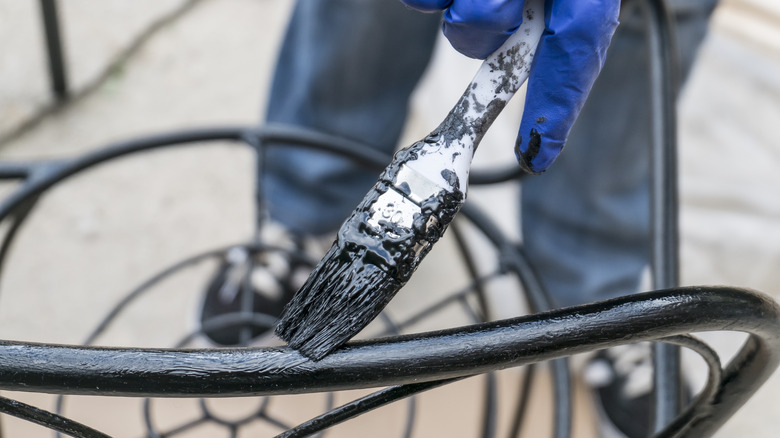Clean Rust Off Outdoor Patio Furniture With This Simple DIY
We may receive a commission on purchases made from links.
The old adage "April showers bring May flowers" highlights one of the best aspects of springtime, but there can be downsides to those upcoming rainstorms. At a large scale, heavy rains could exacerbate the fire season by encouraging extra plant growth. On a more personal level, though, the rain might cause your metal patio furniture to rust after you pull it out of storage to enjoy some iced tea in the warm sun. Rusting is an almost unavoidable occurrence for many metals. Materials containing iron will oxidize, losing electrons when exposed to oxygen molecules. Then, those ions form hydrous iron oxide, or rust, when attached to water molecules. You may see rust forming more in the warmer spring and summer months because the heat and humidity will speed up these chemical reactions. Luckily, there is a hack to solve this natural problem that you undoubtedly already have at home: A bottle of vinegar.
While we typically use it for smothering potato chips, flavoring salad dressings, or pickling our favorite foods, vinegar can be a versatile cleaning tool. Distilled white vinegar is good for removing strong odors from your living space and often combined with products like baking soda to create household cleaning solutions. To deal with rusting furniture, you can easily make your own cleaning spray with little more than white vinegar and salt. Your local supermarket should sell vinegar by the gallon for less than $5, so this is a quick and easy DIY that will net you enough extra supplies to make a good marinade for your dinner tonight, too.
How to use vinegar to clean rust off of patio furniture
When you're ready to tackle the rust, the first thing you're going to want to do is drag your patio furniture into the shade to help slow the evaporation of the vinegar solution you apply. The goal is to remove as much rust as possible, though this may be difficult if the corrosion goes deep. Mix your vinegar with around ¼ cup of salt in a spray bottle, as salt will enhance the strength of vinegar's acetic acid, and spray this solution on any rust stains you can find.
Allow the rusty patio furniture to sit for at least 15 minutes with the vinegar solution. If possible, leave it for a few hours. After this, you're going to have to manually scrape the rust away. A wire brush or brush heads attached to the end of an electric drill are going to be the best tools for the job. Just be careful; there are a lot of benefits to choosing cast iron patio furniture and other metal outdoor pieces, but if the material is thin, you risk compromising its structural integrity when the rust has corroded too deep. Use a medium-grit sandpaper to smooth out any rough edges and remove the last bits of rust you can find, or consider a rust-removal gel, like navel jelly, if the furniture is too difficult to manually sand down.
Protect yourself from rusty patio furniture
Though rusty metal is not the explicit source of tetanus as popular parlance would suggest, the bacteria, Clostridium tetani, is often carried by dirty, rusty materials. Corroded metal can be sharp, which makes it easier to become infected with tetanus through broken skin. Vinegar may be one of the best ways to clean your metal outdoor furniture, especially cast iron pieces, but you want to make sure you're wearing the right protective equipment before engaging with any sharp metals. Thick gloves will protect your hands when dealing with objects like rusty hardware, and you'll want goggles and a mask when scraping corroded areas; this process is likely to leave flakes of rust floating in the air.
While vinegar and salt make a quick and easy solution to bust out whenever you notice your patio furniture starting to rust, it's not always going to be ideal in the long term. The acidity of vinegar might speed up furniture rusting in some cases, so you're going to want to wash and dry any affected spots thoroughly once you've finished cleaning. Prevention will be your best bet for dealing with rusty furniture at the end of the day. Whenever bare metal is exposed, you can paint it over with rust-resistant metal primer, like Rust-Oleum Clean Metal Primer, which will stop rust from spreading underneath. It's not an ideal choice for every patio item, but it will help your furniture last much longer.


